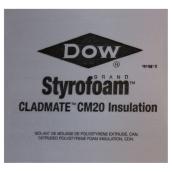It is used in both residential and commercial construction in any climate across the United States. It is recyclable and lightweight, and it is easy to handle and install. FOAMULAR 2retards the transmission of water vapor and moisture in masonry walls. It can be used anywhere insulation is needed. It performs well as insulation for garages, pole barns, basements, and crawl spaces.
What are the pros and cons of polystyrene insulation? Why is polystyrene good for insulation? What is the are value of rigid board insulation? Choose this option for areas that need a good amount of strength and water resistance. Extruded Polystyrene.
It provides about R-per inch. This material offers the highest R-values—about R-to 6. Products with foil facing help the panels resist moisture vapor. Free 2-day Shipping On Millions of Items.
The boards are lightweight, durable and impact resistant which helps to reduce job site damage. Foam insulation can be scored and fabricated easily with common hand tools. Widely reported research by Dow Chemical Co.
EPS) in below-grade insulation applications. Rigid extruded polystyrene insulation (XPS) can be used as general purpose insulation for roofing, wall and foundation applications requiring a minimum compressive strength. Continuous insulation (Ci) for above grade walls, as well as below grade walls and floors. EPS is expanded polystyrene, also known as molded polystyrene.
This insulation board is probably one of the most widely used foam board insulation products in the residential construction industry. XPS has an R value of 4. It is produced from general purpose polystyrene by the process of extrusion. These extruded sheets have a closed-cell structure and virtually no air-voids in between the cells. This foam board insulation is the rigid pink or blue panels that can be found at home centers in many different thicknesses. It is denser than EPS and provides more R-Value with a rating of per inch of thickness.
The products are organize left to right, in ascending compressive strength. EPS is made of trapped air and only plastic, making it an efficient insulator with a small amount of raw material. Thermal Insulation for pipes, ducts and equipment. Expanded polystyrene is very versatile because it can be molded and cut into different. GreenGuard extruded polystyrene (XPS) does not absorb moisture and retains its insulating properties over time, making it an ideal exterior insulation.

With an R-Value of 5. Plus, it’s light weight, easy to handle, and easy to cut with a knife. Taping the extruded polystyrene (XPS) foam insulation board joints seals them against air infiltration for improved energy efficiency. It is preferable to secure extruded polystyrene (XPS) foam insulation boards with 25. It is low-cost and can eliminate thermal bridging. It is a form of continuous insulation when applied externally, as designed.
Manufactured by Dow Chemical, Styrofoam Brand Foam is available in a variety of thicknesses in both x and x dimensions. Tough, closed-cell extruded polystyrene foam with a reputation as a dependable product. Its superior resistance to water assures long-term R-value retention in applications such as foundation perimeters, wall insulation and drywall laminate. Available in a broad range of densities for any application.

Fanfold backer board is also available for. Of all the types of insulation , extruded polystyrene (XPS) is among the simplest to install. A 2-inch thick sheet of this rigid foam board insulation provides thermal resistance, or R-value, of.
The product has a high compressive strength and the closed cell structure makes it resistant to water.
No comments:
Post a Comment
Note: only a member of this blog may post a comment.